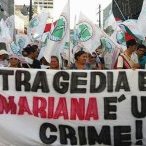English · Español

14 de marzo de 2016 | Entrevistas | Derechos humanos | Industrias extractivas | Justicia climática y energía | ¡Berta vive!
Days of action around International Day of Struggle against Dams
This year, the Movement of People Affected by Dams (MAB, for its acronym in Portuguese) of Brazil, has started earlier its actions around March 14, International Day of Struggle against Dams, for Rivers, Water and Life. On March 8, the protagonists of the National Days of Struggle were the women of the movement.
There were four themes of mobilization: demand for justice for the socioenvironmental crime committed by Samarco, Vale and BHP Biliton mining companies last year in Mariana, Minas Gerais State; the campaign "The price of electricity is a robbery"; the demands for a national policy to protect the rights of the people affected by dams; and the rejection to the attempts by the Brazilian parliament to privatize more and more public companies.
We interviewed Sonia Mara Maranho, member of MAB to know more about this. These days are also being held "in solidarity with the people of Honduras, COPINH, and with Berta Caceres family, and in support of Gustavo Castro, from Mexico", said Sonia. "The international, capitalist, imperialist system has taken Berta away from us, from the struggle of the people affected, the territories and Latin America as a whole. But we will continue fighting, following the dreams we built together with Berta in the past years. She was a great human rights defender", she added.
Together with women of the Landless Rural Workers Movement of Brazil and the Movement for the Popular Sovereignty of Mining, the MAB activists blocked different roads and railroads leading to Samarco and Vale mines in Mariana, where four months ago these companies were responsible for the largest environmental crime in the history of Brazil. "This mining development model needs to change. Mariana is an example of the crisis of the capitalist, imperialist, patriarchal system, because in our assessment, the problem was that in that moment the price of oil at world level was dropping, so they needed to produce more in less time, with a higher exploitation of workers, and that is how the walls collapsed", said Sonia.
Four months after the disaster which caused the death of 20 people, those affected haven´t been compensated. "We are also rejecting the fact that the agreement signed by the federal and State governments does not take into consideration the participation of the people affected".
Another one of the struggles of the MAB is the historical push for the
implementation of a national policy for people affected by dams. About this, Sonia said that precisely on March 8th there was an advance in Minas Gerais with the passing of a policy related to this by the House of Representatives: "If this policy is passed by Congress, it would be an important victory for us", said the Brazilian activist.
The movement is also carrying out a campaign against excessive prices of electricity in Brazil. As an example, Sonia made reference to a situation involving the Samarco mining company in Minas Gerais State: "In this State we have the most expensive rate in Brazil: We pay about 250 dollars per mega-watt. Samarco has signed an agreement with CEMIG for 409 mega-watts, half of which were used for mining activities. The other half was sold to the free market at 205 dollars per mega-watt. This means that Samarco, the company responsible for this great environmental disaster, didn´t pay for electricity in 2014, because half of it was sold at a very high price, while the average paid to Cemig per mega-watt was 17.5 dollars.
"The Brazilian families are the ones paying for this corporate speculation process with our natural resources", concluded Sonia.
Imagen: MAB








